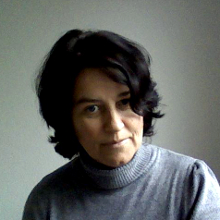
Beatrix Ursula Bettina FABER
- Qualifica
- Ricercatrice Universitaria
- Telefono
- 041 234 7864
-
faberbe@unive.it
- SSD
- Letteratura tedesca [GERM-01/B]
- Sito web
-
www.unive.it/persone/faberbe (scheda personale)
- Struttura
-
Dipartimento di Studi Linguistici e Culturali Comparati
Sito web struttura: https://www.unive.it/dslcc
Sede: Palazzo Cosulich
(please scroll down for the English version)
Bettina Faber è ricercatrice di Letteratura tedesca all'Università Ca' Foscari di Venezia dal 2000.
Nata a Colonia (Germania) ha conseguito studi di filosofia, teologia, germanistica, e pedagogia presso le Università di Bonn, Padova, Venezia e Colonia (dal 1980-1986 come borsista del Cusanuswerk). Si è laureata nel 1985 e nel 1986 presso la Rheinische-Friedrich-Wilhmelms-Universität di Bonn e nel 1996 presso l'Università Ca' Foscari di Venezia (con una tesi sulla teoria del tragico in Søren Kierkegaard pubblicata nel 1998).
Dal 1990 al 2000 è stata lettrice di lingua tedesca presso la sezione di Germanistica del Dipartimento di Studi Linguistici e Letterari europei e postcoloniali della Facoltà di Lingue dell'Università di Venezia, mentre dal 2000 ha coperto il ruolo di ricercatore di Lingua e Letteratura Tedesca presso la medesima struttura, ora Dipartimento di Studi Linguistici e Culturali Comparati.
È stata membro del Consiglio direttivo della Società Italiana per gli Studi Kierkegaardiani e del Comitato di redazione della rivista scientifica Nota bene. Quaderni di Studi Kierkegaardiani ed e membro dell'AIG (Associazione Italiana Germanisti).
Ricerca, didattica e pubblicazioni vertono attorno alla letteratura tedesca del Settecento e del primo Ottocento, Friedrich Schiller, Friedrich Hölderlin, Heinrich von Kleist, Georg Büchner, e la letteratura contemporanea con particolare attenzione al teatro tedesco e ai legami fra letteratura e teoria estetica, antropologia e filosofia della storia e delle culture.
Più recentemente ha pubblicato degli studi su Kleist riguardanti il suo rapporto alle correnti filosofiche ed estetiche dell'epoca e la sua ricezione attuale (vedi pubblicazioni) mentre attualmente sta svolgendo delle ricerche sulla teoria del tragico in Hölderlin e sui concetti di libertà nella letteratura tedesca dell'era napoleonica.
Ha
collaborato con varie università e istituzioni internazionali e
italiane tra cui la Heinrich-von-Kleist-Gesellschaft per
l'organizzazione di un Convegno Internazionale e molteplici eventi
culturali attorno al bicentenario della morte di Heinrich von Kleist
nel 2011, e l'Associazione Richard Wagner per un progetto di
particolare rilievo con Stefan Herheim, uno dei registi d'opera più
renomati a livello mondiale, in occasione dell'importante anno
wagneriano 2013. Nel 2017 ha realizzato un importante evento attorno al teatro contemporaneo con Cesare Lievi, regista di fama internazionale e di grande successo anche nel mondo del teatro tedesco e austriaco.
Nel semestre invernale 2013/14 è stata invitata a trascorrere un periodo di ricerca all'Institut für deutsche Sprache und Literatur I dell'Univerisät zu Köln, struttura presso la quale nel semestre 2008/09 ha già svolto attività di docenza.
È titolare di tre scambi Erasmus con le Università di Köln, Tübingen e Bayreuth.
Bettina
Faber is an Assistant Professor of German Literature at the
University Ca' Foscari of Venice since 2000.
Born in Cologne (Germany), her studies covered philosophy, theology, German literature, and pedagogy at the Universities of Bonn, Cologne Padua, and Venice. She graduated in 1985 and 1986 from the Rheinische Friedrich-Wilhlems-Universität of Bonn and obtained her italian degree in 1996 at the University Ca' Foscari of Venice (with a thesis about Søren Kierkegaard's Theory of the Tragic which was subsequently published in 1998).
From 1990 -2000 she was a Language Assistant (Lettrice) in German in the Section of German Studies of the Department of Linguistics and European and Post-colonial Literary Studies of the University of Venice. Since 2000 she has been Assistant Professor of German Language and Literature at the institute now renamed Department of Linguistics and Comparative Cultural Studies.
She has been a member of the Advisory Committee of the Italian Kierkegaard Society (Società Italiana per gli Studi Kierkegaardiani), member of the editorial-commitee of the scientific journal Nota bene. Quaderni di Studi Kierkegaardiani, and Italian Association of German studies AIG (Associazione Italiana Germanisti).
Her research and teaching activities focus on German literature of 18th and early 19th century: Friedrich Schiller, Friedrich Hölderlin, Heinrich von Kleist, Georg Büchner, and contemporary German literature, with particular attention on the relationship between literature and aesthetics, anthropology and philosophy of history and culture.
More recently she published articles on Kleist’s links with the philosophical and aestetic currents of his time (s. publications) and today's reception of his work. Her present research centres on Hölderlin's Theory of the Tragic and the concepts of freedom emerging from the German literature from the age of Enlightenment to the era of Restauration (with a particular focus on the Napoleonic Era).
She
collaborated with several international and Italian universities and
institutions like the Heinrich-von Kleist-Gesellschaft in
organizing an International Congress and various cultural events on
occasion of the bicentenary of the death of Heinrich von Kleist, in
2011, and the Associazione Richard Wagner for a project of
special cultural interest together with Stefan Herheim, one of the
most brilliant directors of opera world wide, for the Wagnerian year
2013. In 2017 she organized an important event about contemporary theatre with Cesare
Lievi, an internationally known and also extremely successful theatre director in the world of German and Austrian theatre.
In
the winter- term 2013/14 she was invited to carry out her research
activities at the Institut für deutsche Sprache und Literatur I
of the Universität zu Köln where she had already lectured
earlier as a visiting professor during the winter term 2008/09. She is an Erasmus-coordinator for exchange programs with the Universities of Bayreuth, Cologne and Tübingen.
Le informazioni riportate sono state caricate sul sito dell'Università Ca' Foscari Venezia direttamente dall'utente a cui si riferisce la pagina. La correttezza e veridicità delle informazioni pubblicate sono di esclusiva responsabilità del singolo utente.
